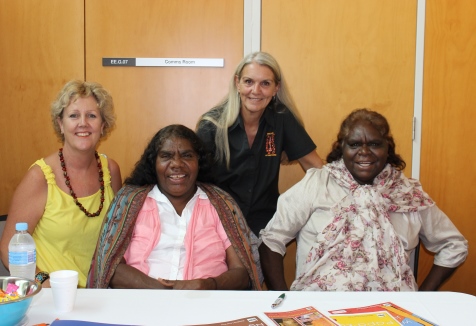Working in remote Australia

Pictured: Ros Bauer, Adult Literacy Teacher; Barbara Napanangka Martin, Teacher at Yuendumu School; Susie Lowe, Director of Walpiri Youth Development Aboriginal Corporation; Nancy Naparurrla O'Brien, Teacher at Yuendumu School.
Teaching has many challenges – not least ensuring that you cater to a range of learning styles. Working in a remote setting presents a further set of challenges, which were highlighted recently when the University was visited by two esteemed educators who take on these challenges on a daily basis when teaching students at the Yuendumu School in the Northern Territory.
Nancy Naparrurla Oldfield started her career as a Literacy worker at the Yuendumu School in 1979. She is now a senior teacher and works with children in early childhood and teaches Walpiri language. Her 34 years of commitment to Walpiri education was recently recognised on World Teacher’s Day this year when she received the Excellence in Teaching/Leadership in Aboriginal and Torres Strait Islander Education award.
Nancy’s colleague Barbara Napanagka Martin began teaching in 1981 and she is now a senior teacher and cultural advisor for the Yuendumu School. Both teachers were guest speakers at Ed Fest on the Parramatta campus in February.
As well as teaching, Nancy and Barbara take students on excursions interstate and around Yuendumu to find and identify local plants. Other excursions see students travelling interstate to explore other cultures and places.
“One of the best things about working remote is being close to our family and land,” say Nancy and Barbara. “We love our people and we love our country – and we like to help the kids and their families grow.”
Both teachers say their greatest satisfaction is teaching. Mostly, Nancy and Barbara enjoy watching the kids learn and seeing them improve their literacy. Their goal is to ensure all of the kids reach their potential and graduate from school. Literacy plays a large role in the teaching at Yuendumu, as both Nancy and Barbara emphasise the importance of the children gaining an understanding of their first language before learning their second language, English. “It’s important, as we don’t want to lose our language,” say the teachers.
The teachers are keen to see more University students from around Australia get involved with teaching in remote indigenous communities, such as Yuendumu, and say they accept them into their community as if they were part of the family.
If you know a student who is interested in an internship in a remote indigenous community, please contact Shirley Gilbert from the School of Education via email s.gilbert@uws.edu.au or call extension 2412.
Mobile options:

